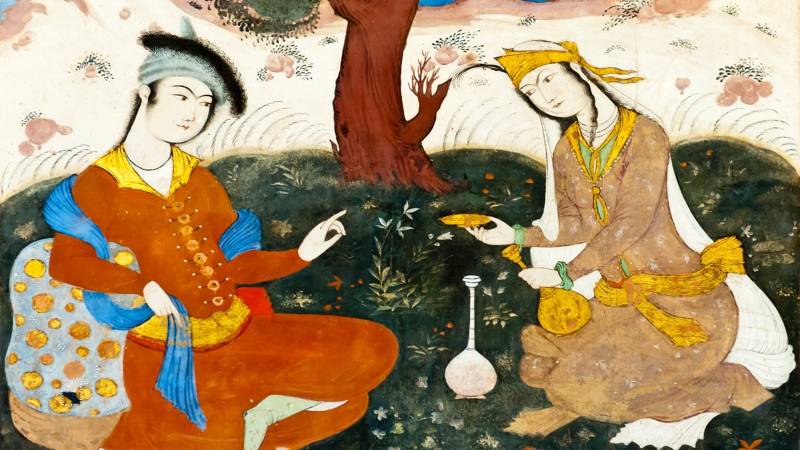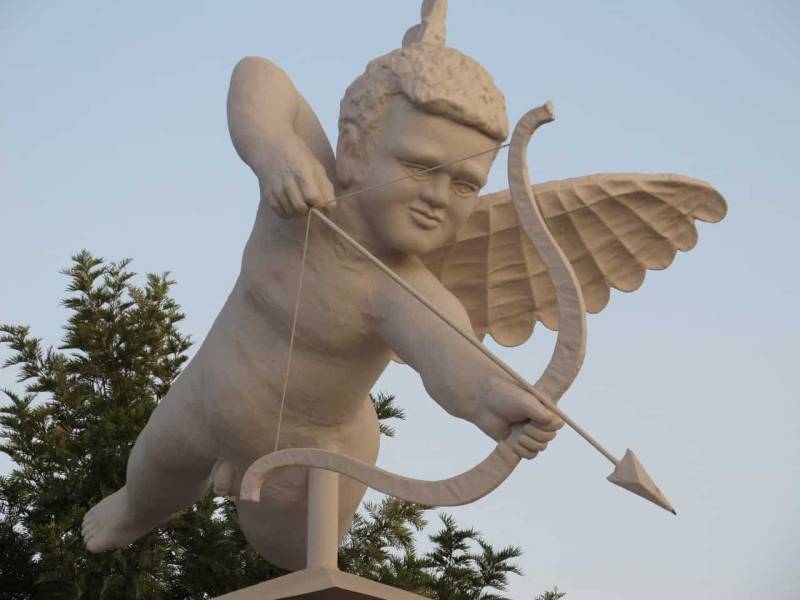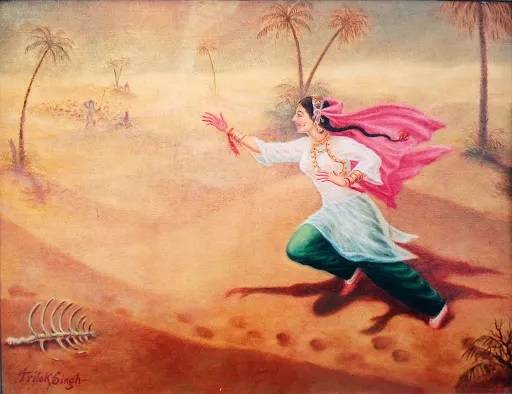
The history of humans is replete with references to love. We read about the empires won and wars lost because of love. We also know that a few years after Babur’s death in India, his Pashtun wife Bibi Mubaraka travelled from Kabul to Agra to bring his remains to Kabul. She was motivated by the love that Babur had shown towards her. More about her story later.
So, what it is that makes people in love do impossible things? Or, what triggers the process?
The Economist magazine in a recent issue described love as a power that makes the world go around: a fire that can warm you heart or burn down a house; a deep sea, the greatest pleasure; infinity; blindness.
But still we are unable to explain how it is that two strangers, seeing each other across the room full of people, become nervous and their hearts start racing. Is this something we are endowed with, or just a fleeting phenomenon that has no lasting effects?
Poets, philosophers and sages have talked about love. All they could do was to describe the feelings or longings, but not why it happens. They could see the effects but could not explain the reasons. They could say that love is a many splendored thing but couldn’t say why.
One woman Helen Fisher, a biologic anthropologist embarked upon unravelling the secrets of love. She ran an intriguing experiment. She took 17 students who were freshly in love. They thought of their sweetheart all the time and asked if they would die for the person, the answer was a non-hesitant and affirmative yes.
She put selected students under functional Magnetic Resonant Scanner (fMRI). When she showed them the photo of their sweetheart, a certain part of their brain lit up.
Bibi Mubaraka never forgot that her husband wanted to be buried in Kabul in his favourite garden. Through emissaries she inquired if Sher Shah Suri would allow her to travel from Kabul to Agra to bring the body of her husband to Kabul
This part is in the ventral tegmental area at the base of the brain. It is where the factory that manufactures dopamine is located. It is also where Cupid resides. He has in his quiver arrows tipped in dopamine ready to go.

Unfortunately, it is also the area that lights up in addicts hooked to food, and addiction-causing chemicals such as cocaine, heroin, fontanel etc.
With the passage of time, one would think the dopamine effect might lose its pull. Two people married a few decades may not show the sex drive of a younger couple, but many are still in love. How does this transition happen? We don’t know. But there are couples still in love decades after receiving a dopamine tipped arrow to their hearts. And they are still in love when sex is not part of their lives.
During his four incursions from Kabul into India, Emperor Babur had to pass through the Yousafzai territory. The warring Yousafzai Pashtuns caused him the most grief by attacking his army and impeding his passage. Marriage with a young Yousafzai woman would remove obstacles from his incursion to India.
Babur asked for the hand of a young maiden, daughter of the chief of the Yousafzai tribe. The tribe agreed and the girl Bibi Mubaraka became one of Babur’s wives.
Babur had always wanted to be buried in Kabul. Indian summers were not suited to his temperament. Just in his fourth year of ruling India, at age 47, he died in Agra, and was buried there.
With Babur’s death his son Humayun could not maintain control of the vast empire and lost it to Sher Shah Suri, an Afghan king. Humayun went into exile to regroup. Babur’s family made a hurried retreat to Kabul.
Bibi Mubaraka never forgot that her husband wanted to be buried in Kabul in his favourite garden. Through emissaries she inquired if Sher Shah Suri would allow her to travel from Kabul to Agra to bring the body of her husband to Kabul. Sher Shah not only permitted her and her retinue to travel to Agra, but he also facilitated the travel. This was her abiding love for her husband that compelled her to undertake the arduous journey of 1,200 km each way to fulfil her husband’s last wish.
In a remarkable long poem about the love between the Yousafzai maiden and Emperor Babur, Sahibzada Riaz Noor, a Pakistani poet par excellence, wrote the poem in the voice of Bibi Mubaraka:
I brought him back
From Hind to Kabul
To lay him down
In his resting place final
Thus did I ultimately
Requite the love he gave
In everlasting
Timeless memory
Now some poets have a different perspective. They are willing to sacrifice anything and everything for the glimpse of the beloved or even the black mole on her cheek. Hafez Shirazi was willing to give away Samarkand and Bukhara for the black mole on the cheek of his beloved.
اگر آں ترک شیرازی بہ دست آرد دل ما را
بہ خال ہندوش بخشم سمرقند و بخارا را
If that Maiden of Shiraz would accept and hold my heart in her hand
I would give away the cities of Samarkand and Bukhara for the black mole on her face
Turco-Mongol ruler Amir Timur had known of Hafez and his poetry, but when he heard the couplet (sher) mentioned above, he summoned Hafez to his court. It is said that Hafez, out of fear of the Sultan, presented himself in the court dressed in ordinary clothes. Timur, in anger, demanded to know as to why Hafez was willing to give away the Sultan’s prized and favourite cities, that he had conquered by sword, for merely a mole.
To that Hafez replied, “Oh my King, I am a careless and unwise man. I have splurged and wasted my wealth to the point that I did not have decent clothes to present myself in your court.” Timur, impressed with Hafez’s presence of mind, forgave him. A two-line expression of love would have brought Hafez’s life to an abrupt and premature end.
History is replete with examples of wars being fought and lost over love. It has been suggested that Austro-Hungarian empire was defeated in WWI because General Conrad Von Hötzendorf, head of the army was deeply in love with an Italian married woman to whom he would write letters once or twice a day and so enamoured with her that he was not paying full attention to the war efforts. Poor devil lost on both fronts.

Every culture has its own epics of love and lament. In English, we have Romeo and Juliet. In Pashtu, we have Adam Khan Durkhani and in Punjabi we have the story of Heer Ranjha. In Sindhi literature we find the tragic story of Sassi Pannu. Here is one sher from a 1930 Punjabi ghazal that was sung by the immortal Kundal Lal Saigal:
پنوں دل دا کھوٹا جے جھانسا نہ دیندا
تے سسی تھلی جا کے سڑدی کدی ناں
If Pannu with untrue heart would not have tricked Sassi
She would not have died miserably in the desert of Thal
Love is a potent force that can move mountains or sweep anything that comes in the way by destroying it. This is not a transient or superficial phenomenon. We are hardwired for love and the effects of dopamine on our brains are real. Very few mortals can escape cupid’s arrows.
Love is, indeed, a many splendored thing.

